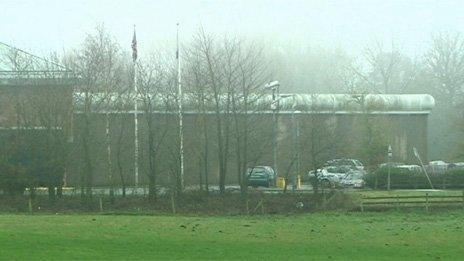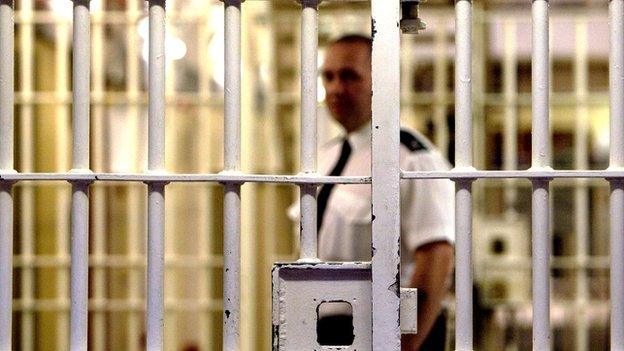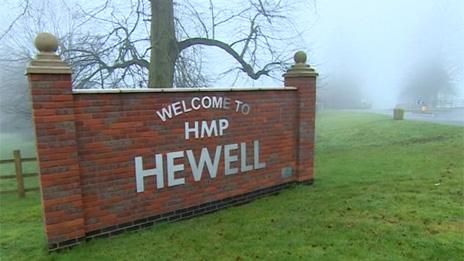HMP Hewell's vulnerable prisoners 'address issues by self-harming'
- Published

Some 40% of cells at HMP Hewell are overcrowded, according to the new report
Vulnerable prisoners at a problem jail are resorting to self-harm to address basic issues, according to inspectors.
HMP Hewell in Worcestershire was last year highlighted by HM Inspectorate of Prisons for its high levels of assaults and drug use.
In a new report, inspectors said there had been one murder and six suicides since their last visit, and incidents of self-harming and bullying were high.
The jail said progress had been "slow" but there was a "solid foundation".
Since its last inspection, HMIP said there had been "limited progress and deterioration in some areas".
Chief inspector Nick Hardwick said Hewell "continued to face real difficulties" and there were "substantial safety concerns".
'Overcrowded and understaffed'
The report said care for prisoners most at risk was "reasonable", but inspectors were concerned some "felt they could only resolve issues, such as access to basic amenities, by self-harming".
Most of the criticism was reserved for the closed prison, which houses 1,100 prisoners, with another 200 at the open section at Hewell Grange.
Inspectors said arrangements to tackle violence were "inadequate" and they "were not persuaded that the prison was aware of all incidents".
The report said more prisoners than normal said they "felt unsafe" and reported "high levels of victimisation".
Inspectors also highlighted a number of allegations against staff, some serious, which they said "had been investigated poorly or, in some cases, not at all".
Frances Crook, Chief Executive of the Howard League for Penal Reform, said it was "the latest in a long line" of negative reports.
"Cramming more people into overcrowded and understaffed prisons leads only to more self-harm, more violence and more victims," she said.
The organisation said Hewell had seen frontline officers cut from 330 in August 2010 to 170 by the end of June 2014.
Developed drug problems
According to the HMIP report, 40% of cells were overcrowded, while access to basic services such as clothing, cleaning materials and mail were all poor.
However, it said hygiene had improved since the "very poor" conditions seen last year.
Although cleaning materials were difficult to obtain, the report said drugs and prescription medications were easy to get hold of, according to prisoners.
It said 17% had said they had developed a drug problem in the prison.
Inspectors said substance misuse services were appreciated by prisoners but their efforts were hampered by staff shortages.
There was praise in the report, however, for relations between staff and prisoners, as well as HMP Hewell's approach to resettlement.
Responding to the report on behalf of HMP Hewell, Michael Spurr, chief executive of the National Offender Management Service, said: "I accept that progress in delivering necessary improvements at Hewell has been too slow.
"Prior to this unannounced inspection a new governor had been appointed to lead a performance improvement programme, and as the chief inspector acknowledges, he is now getting to grips with the issues in a systematic and structured way."
- Published23 October 2014

- Published23 April 2013
